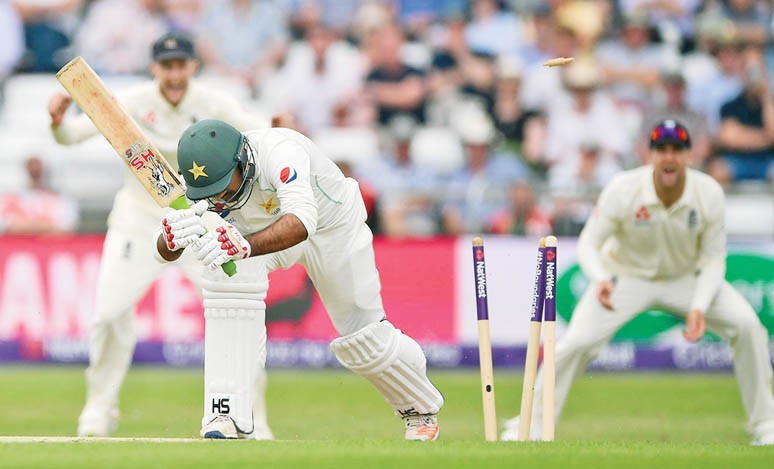
Once again, it was their brittle batting that shattered a dream for the tourists in England

After winning the historic Test against Ireland and the first Test against England at Lord’s, Pakistan were very much in the run to win their first Test series in England since 1996 and the fifth position in the ICC Test team ranking.
But once again it was batting that shattered a dream as in the second Test at Leeds, Pakistan were bowled out for just 174 on day one and from there they never recovered. They were bowled out for just 145 in the second innings and were defeated by an innings and 55 runs inside three days.
It was England’s first victory in a Test match since they beat the West Indies at Lord’s in September last year. By winning the second Test, England avoided a third successive series loss. They had been beaten in Australia and New Zealand.
The first Test defeat at Lord’s was not only the first time England lost the opening Test of a home summer since 1995, but also one of their worst home performances in recent years.
The last time Pakistan won a Test series in England was in 1996 when under the leadership of Wasim Akram the visitors beat Mike Atherton & company 2-0.
Man-of-the-Series leg-spinner Mushtaq Ahmed and fast bowler Waqar Younis were the heroes of the series with 17 and 16 wickets, respectively.
The overall performance during the tour, however, was satisfactory as they beat Ireland and England with their young and inexperienced players.
Opening partnership is very important in all formats of the game. Unfortunately, Pakistan’s new opening pair Inam-ul-Haq and Azhar Ali failed to provide a positive start. There was no fifty runs partnership in any of the six innings of the tour. The openers scored just 13, 2, 12, 12, 0 and 20.
If we look at the most successful Test teams of all time – West Indies (1980-1995) and Australia (1995-2004) – their success was mainly based on outstanding opening pairs.
Their openers provided a solid foundation for imposing totals.
West Indies’ Desmond Haynes and Gordon Greenidge have been the most prolific opening pairs (6,482 runs together at an average of 47), followed by Australia’s Matthew Hayden and Justin Langer (5,655 runs, average 51).
England have been facing the same problem. Since the retirement of Andrew Strauss in 2012, England have been in search of a permanent partner for Alastair Cook, who has had 12 opening partners during this period. Cook’s recent 11-Test opening partnership with Mark Stoneman averaged just 16 runs.
Overall Pakistan team is a good combination of young and experienced players, but the inconsistency is the main hurdle in their success.
Azhar Ali, Babar Azam, Asad Shafiq and Shadab Khan all scored fifties in the Test at Lord’s, but only Shadab was able to reach half-century at Headingley.
After the retirement of Misbah-ul-Haq and Younis Khan, only Asad Shifq has some experience in the middle order.
The two senior most players, Azhar Ali and Asad Shafiq, have the technique for the longest version of the game. But unfortunately they haven’t played together for a long time. Azhar and Shafiq average nearly 54 in partnership over 21 innings.
In the mini Test series, England’s Joe Buttler was the most successful batsman with 161 runs, averaging 80.5, including two fifties. For Pakistan, Haris Sohail scored 114 runs, averaging 38, but failed to score a half-century. On the other hand young Shadab Khan scored 112 runs in three innings but scored two fifties. Interestingly, no century was scored in the series.
Man-of-the-Series Pakistani fast bowler Mohammad Abbas took 10 wickets at an average of 14.20. For England, James Anderson claimed nine wickets, averaging 19.11. Shadab Khan was not successful as a bowler and took only three wickets at a high average of 49.
khurrams87@yahoo.com